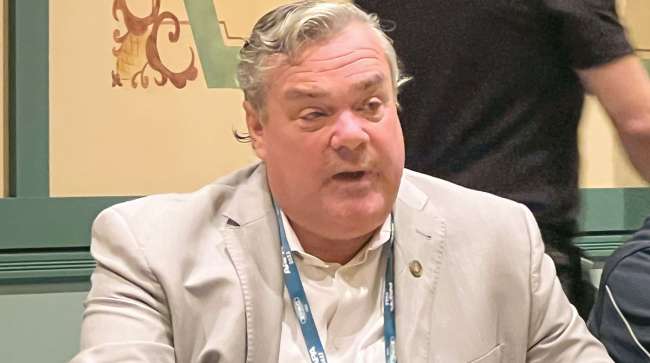Senior Reporter
FMC Commissioner Carl Bentzel Proposes Rule Emphasizing Transparency

[Stay on top of transportation news: Get TTNews in your inbox.]
ORLANDO, Fla. — Federal Maritime Commission member Carl Bentzel proposes to bring more transparency to the ocean shipping industry. Bentzel unveiled his plan at the American Association of Port Authorities’ annual convention Oct. 17.
He said that by providing more real-time information about where a ship is on the ocean, and when it will arrive, ports can be more efficient for the trucking and freight railroad industries, which move the majority of cargo out of those facilities.
Bentzel called his proposal the Maritime Transportation Data Initiative Flow, and he said the key is getting ocean carriers to provide in-transit information such as where their ships are, the type of cargo they are carrying and when their estimated time of arrival is at a port complex.
Bentzel's Background
December 2019-present: Federal Maritime Commission
January 2017-December 2019: Bentzel Strategies LLC
October 2014-December 2019: SB Capitol Consulting
2004-June 2014: DCI Group LLC
Source: LinkedIn
“We want to make sure that everyone knows when cargo ships are coming in, when they’re canceling services, when there’s changes to operating status at marine terminals,” Bentzel told Transport Topics. “We’re just spending too much money and losing too much efficiency not providing this information, and it’s information that’s there.”
Bentzel said he has consulted FMC staff and noted the proposal to provide more real-time information can be done by administrative rulemaking rather than getting a bill through Congress since the agency oversees the free flow of commerce through the shipping industry.
His analysis of the shipping industry, Bentzel said, has shown that in many cases the information already is available. It’s just not being made accessible to the people who need it.
“We have the ocean carriers and the terminals have information related to their operational activities. It’s just that it’s not always being provided to the public or it’s being provided late or it’s being provided erroneously by a third party,” he said. “So we want to make sure that we’re getting the best source of information from the parties that are transporting it, and that it’s timely and that it’s accurate and that it reflects real-time movement of cargo.”
Today kicked off with @FMC_gov's Commissioner Carl Bentzel, who spoke to corporate members on the Maritime Transport Data Initiative (MTDI) and shared ideas for how to mitigate future supply chain crises.
Thank you for meeting with ports today, Commissioner! #PortsUnited — American Association of Port Authorities (@PortsUnited) October 17, 2022
Bentzel pointed out that FMC has just six investigators to monitor the shipping industry, and yet that sector of the economy is responsible for $6 trillion in the nation’s gross domestic product. So in a sense, each investigator must oversee $1 trillion. However the Shipping Reform Act, that was recently signed into law by President Joe Biden, will significantly upgrade the number of people FMC can have, and Bentzel said there are plans to add between 30 and 50 new employees, some of whom will be investigators.
Bentzel said that since the onset of the COVID-19 pandemic, it’s become clear that the nation’s port network has to become more efficient and that the volume of cargo entering these facilities has jumped 27%, with no substantial increase in longshore workers, railroad employees and truck drivers moving the freight.

TT's Eugene Mulero joins host Mike Freeze to discuss the midterm elections, and what the fight for control of Congress will mean for trucking. Tune in above or by going to RoadSigns.ttnews.com.
“If you don’t have trucking going on from a port, you can’t deliver cargo. It needs the wheels and the drivers,” Bentzel said. “The same thing for railroads. And so harmonizing information on when they should show up to pick up cargo and when it’s available, I think will have immediate impact on efficiency.”
Bentzel said he is discussing this plan with shipping, trucking, railroad and other stakeholders and that the response generally has been positive.
“I believe we can do a rule on this. We have authority to regulate practices related to the handling, storing, delivering and receipt of intermodal cargo. That’s the extent of our jurisdiction,” Bentzel said. “I just think it’s unreasonable not to take this step, given the costs of inflation, which our nation has suffered, and they’re related directly to congestion.
Want more news? Listen to today's daily briefing above or go here for more info
“And so I believe we could do a rulemaking and implement federal standards … for information to be made available to the public related to the shipment of intermodal cargoes.”
Bentzel said implementing the rule and getting shippers and others to share nonproprietary information won’t come immediately, but he believes the pandemic has convinced many in the transportation industry that going back to doing things the way they were done before 2020 no longer works.
“It’s not going to be an instantaneous thing. But we have multiple instances where people come up with cargo to the port waiting on a ship that’s not going to be there and millions of dollars of loss," he said. “And so I think the requirements to harness existing information that’s there and make that information public, it’s not a huge cost. There will be some costs, but it’s a relatively small cost given the complexity of the industry and the reliance on all these different modes.”




